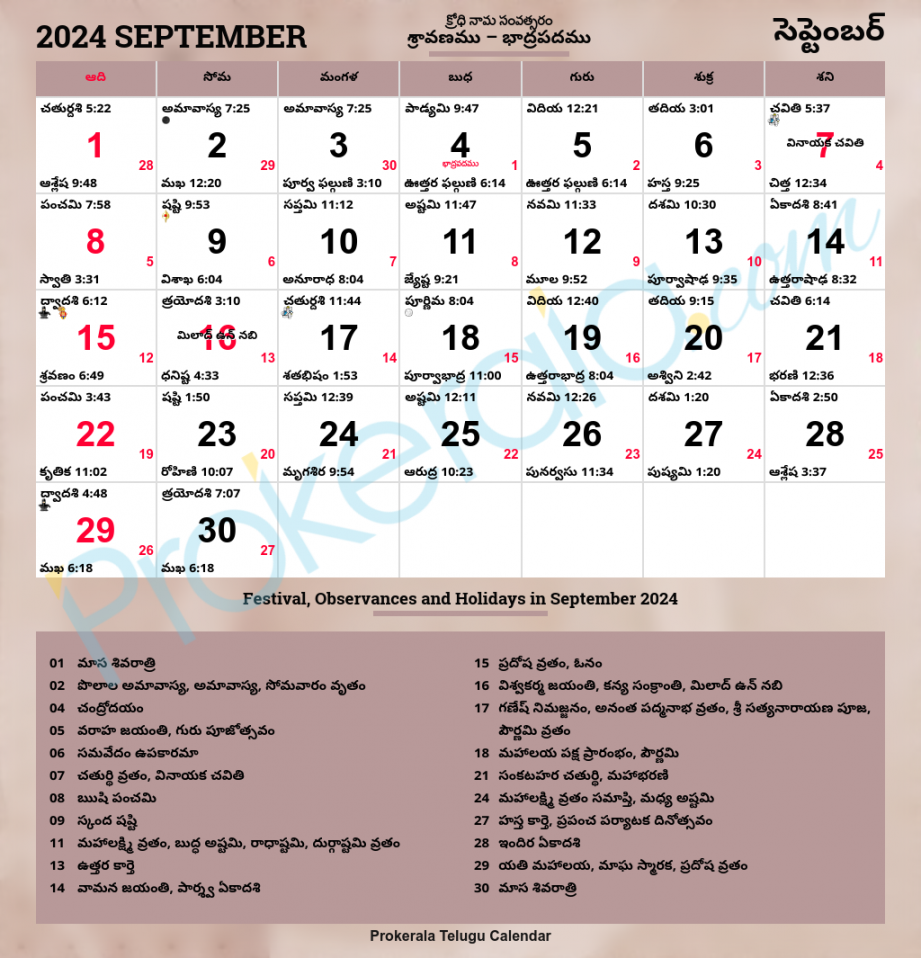Unveiling the 2024 Telugu Calendar for September: A Glimpse into Tradition and Rituals
September, a month bathed in autumn’s golden hues, holds special significance for Telugu-speaking communities worldwide. It’s not just the changing leaves and crisp air that mark this period, but also the unfolding of the Telugu calendar, weaving together ancient traditions with the rhythm of daily life. So, dive with me as we explore the tapestry of “Telugu Calendar 2024 September”: a kaleidoscope of festivals, observances, and cultural nuances.

The Telugu calendar, also known as the “Andhra Calendar,” follows a lunisolar system, blending lunar cycles with the solar year. Unlike the Gregorian calendar, it starts in March and boasts 12 months named after zodiac signs or celestial bodies. This unique system marks time not just in days and months, but also in tithis (lunar days) and nakshatras (lunar mansions), offering a deeper connection to celestial rhythms.

September in the Telugu calendar straddles two months: Sravana (Sravana masam) and Bhadrapada (Bhadrapada masam). The first half of the month resonates with the spirit of Sravana, dedicated to Lord Krishna and marked by Janmashtami celebrations. The air hums with devotional fervor as communities retell his playful childhood pranks and enact scenes from his life.
As Bhadrapada dawns, the focus shifts to Goddess Gowri, worshipped for wisdom and prosperity. Gowri Habba, a vibrant festival, sees women adorning themselves with colorful bangles and kumkum, seeking blessings for marital bliss and family well-being.
Beyond the festive revelry, September in the Telugu calendar is also woven with quiet observances and rituals. Mondays witness Mangalakara Sankranti, a time for propitiating Goddess Lakshmi for auspicious beginnings. Wednesdays are dedicated to Pitru Paksha, a period to honor and offer prayers for ancestors. Additionally, each day holds significance based on tithis and nakshatras, guiding religious practices and auspicious activities.
If you’re curious to delve deeper into the intricacies of the Telugu calendar, September, a vibrant mosaic of festivals and rituals, is a fantastic starting point. Numerous online resources and mobile apps offer detailed information on tithis, nakshatras, auspicious days, and festival dates. Additionally, local astrologers and elders are invaluable sources of wisdom and cultural insights.
September in the Telugu calendar is more than just a chronological marker; it’s a vibrant tapestry woven with threads of tradition, devotion, and cultural practices. By understanding its nuances, we gain a deeper appreciation for the richness of Telugu heritage and connect with the rhythm of life guided by ancient wisdom. So, as September unfolds, open your heart to the melodies of chant, the fragrance of incense, and the warmth of community rituals. Let the Telugu calendar be your guide to this unique cultural landscape, offering a glimpse into a world where time harmonizes with tradition, and every day holds a new promise of celebration and renewal.
1. How can I celebrate Gowri Habba if I’m not of Telugu origin?
You can participate in the festivities by learning about the significance of the puja, offering prayers or Prasad, and enjoying the vibrant cultural atmosphere. Remember to be respectful of local customs and traditions.
2. Are there any special foods associated with September in the Telugu calendar?
Yes, several traditional dishes like Pulihora (tamarind rice), Gongura Pachadi (sorrel chutney), and Vadas are often prepared and enjoyed during festivals and auspicious occasions.
3. How can I find out the tithi and nakshatra for a specific date?
Numerous online resources and mobile apps provide tithi and nakshatra information for any given date. You can also consult local astrologers for a more personalized interpretation.
4. Is the Telugu calendar used only in Andhra Pradesh and Telangana?
The Telugu calendar is followed by Telugu-speaking communities worldwide, including those in neighboring states and the Telugu diaspora.
5. Where can I learn more about Telugu culture and traditions?
Immerse yourself in cultural events, visit temples and historical sites, engage with local communities, and explore online resources such as books, articles, and documentaries. Remember, the best way to learn is through firsthand experience and respectful cultural exchange.


